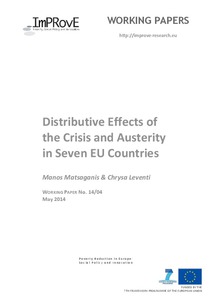Distributive effects of the crisis and austerity in seven EU countries
"European welfare states are under considerable stress. On the one hand, the recession has caused unemployment to rise and household incomes to fall, which both raise the demand for social protection. On the other hand, austerity policies and programme reforms affect the capacity of welfare sta...
| Main Authors: | , , |
|---|---|
| Institution: | ETUI-European Trade Union Institute |
| Format: | TEXT |
| Language: | English |
| Published: |
Antwerp
2014
ImPRovE |
| Subjects: | |
| Online Access: | https://www.labourline.org/KENTIKA-19119987124919371699-Distributive-effects-of-the-cr.htm |
| Summary: | "European welfare states are under considerable stress. On the one hand, the recession has caused unemployment to rise and household incomes to fall, which both raise the demand for social protection. On the other hand, austerity policies and programme reforms affect the capacity of welfare states to provide social protection. This paper aims to provide an early assessment of the distributional implications of the economic developments in Greece, Spain, Italy, Portugal, Latvia, Lithuania and Romania in the period 2009-13. Using a microsimulation model, we attempt to disentangle the first-order effects of tax-benefit policies from the overall effects of the crisis. Moreover, we estimate how the burden of the crisis has been shared across income groups, and how the differential impact of the crisis may have altered the composition of the population in poverty. We conclude by discussing the methodological pitfalls and policy implications of our research." |
|---|---|
| Physical Description: | 54 p. Digital |

